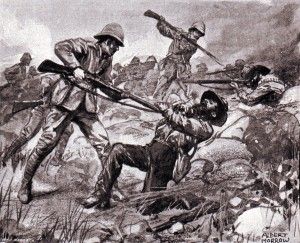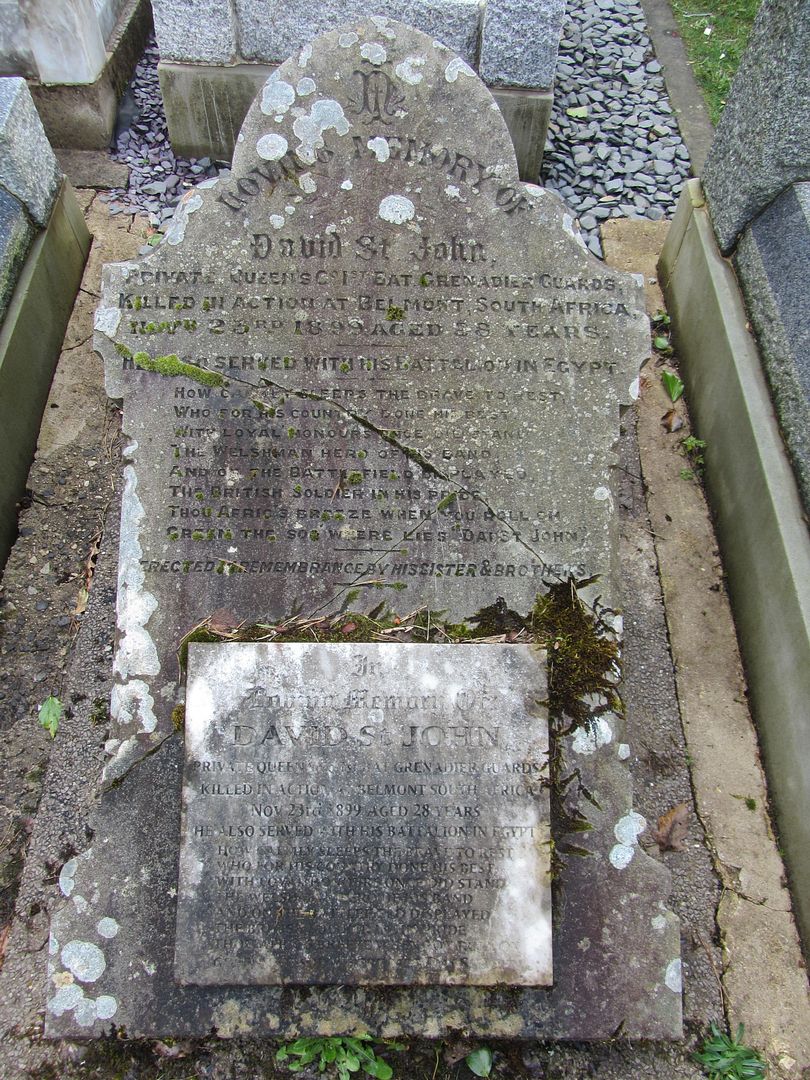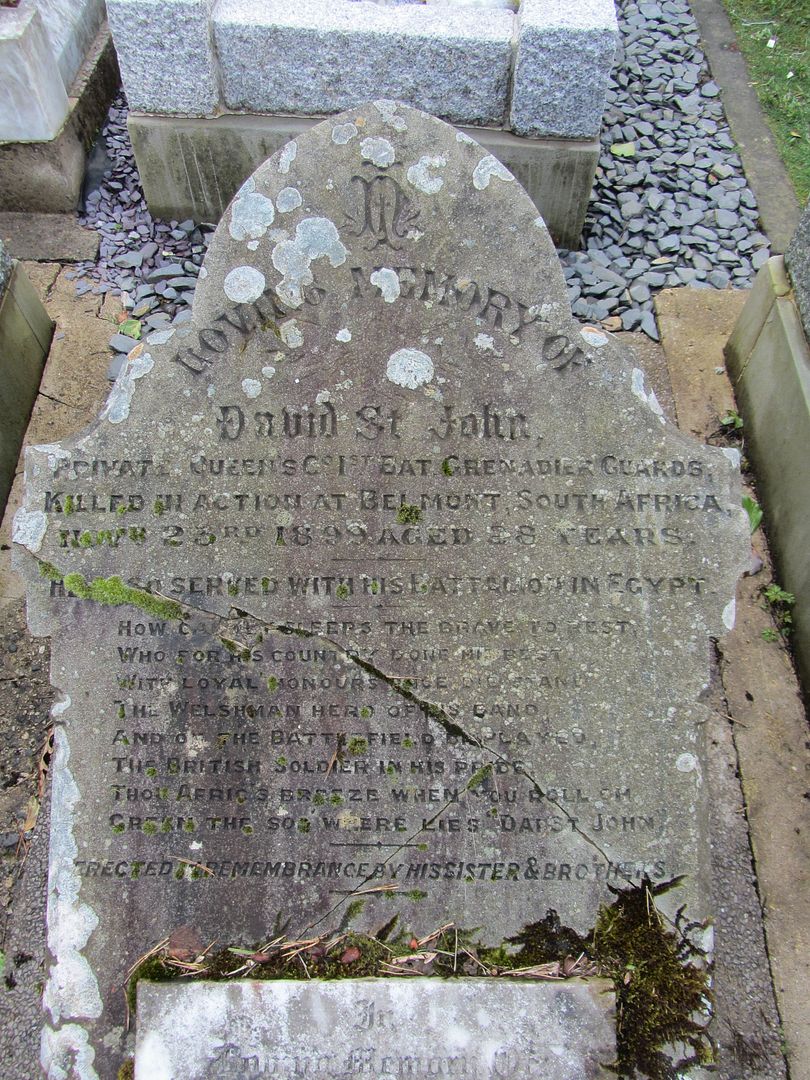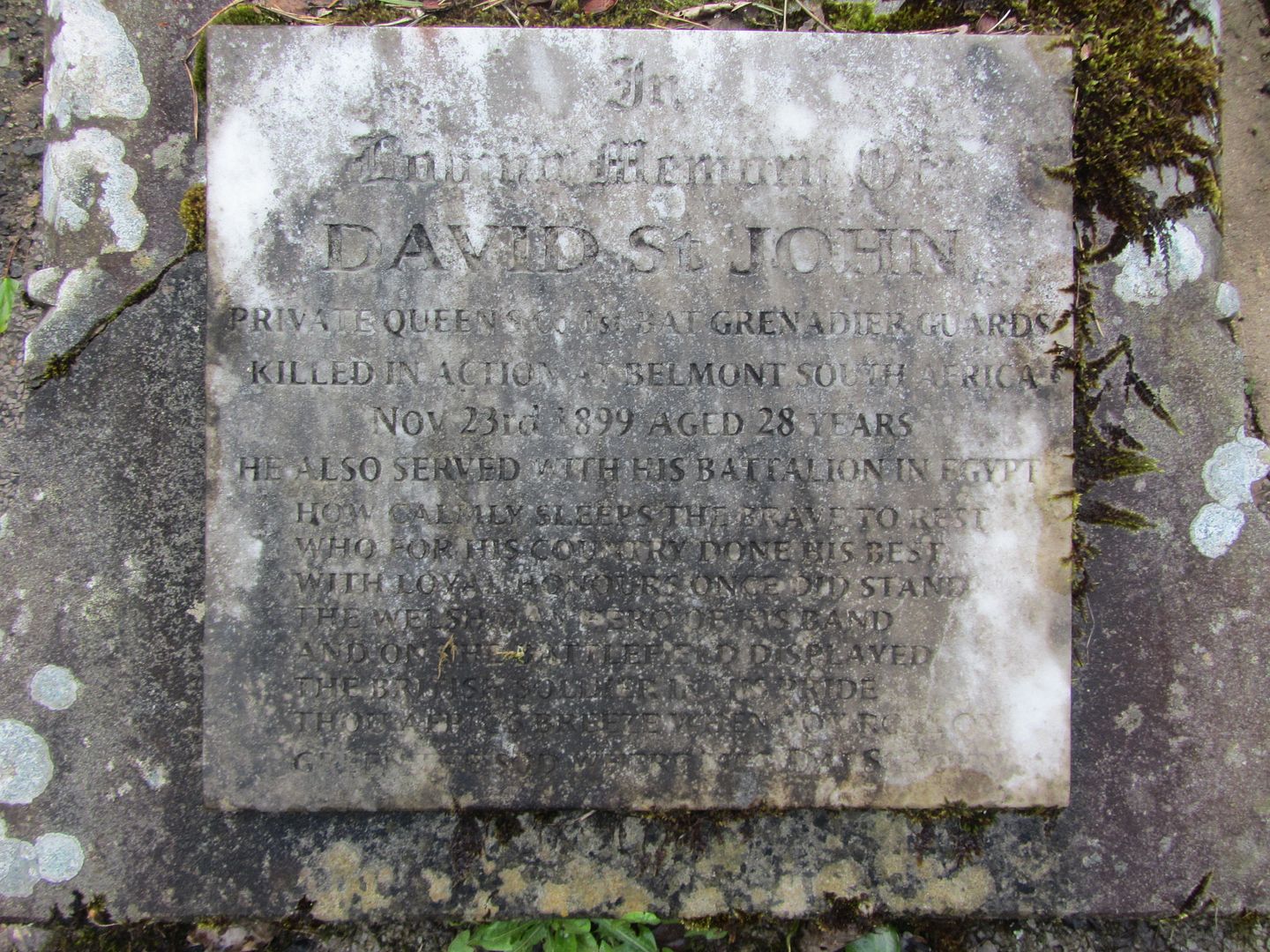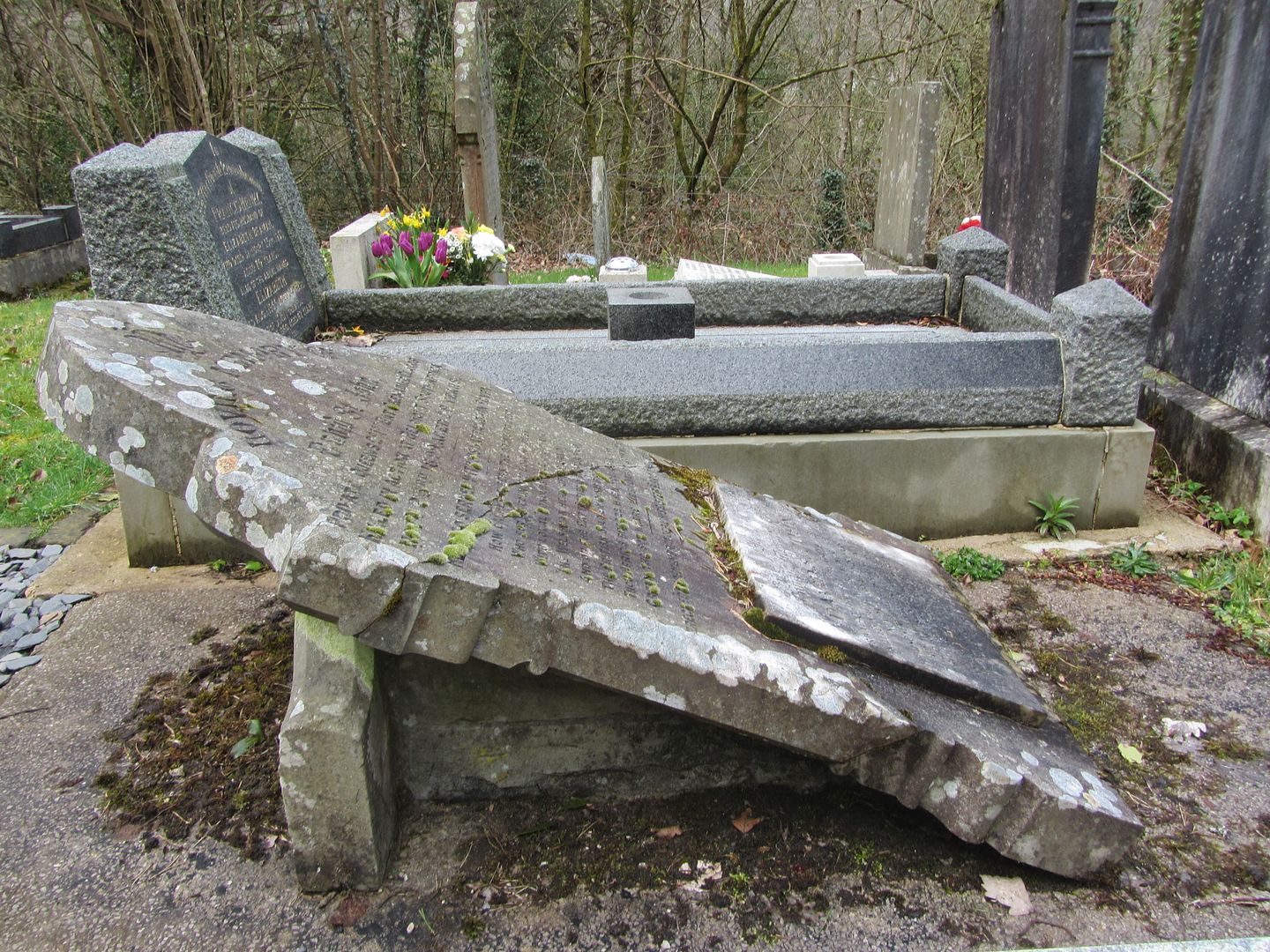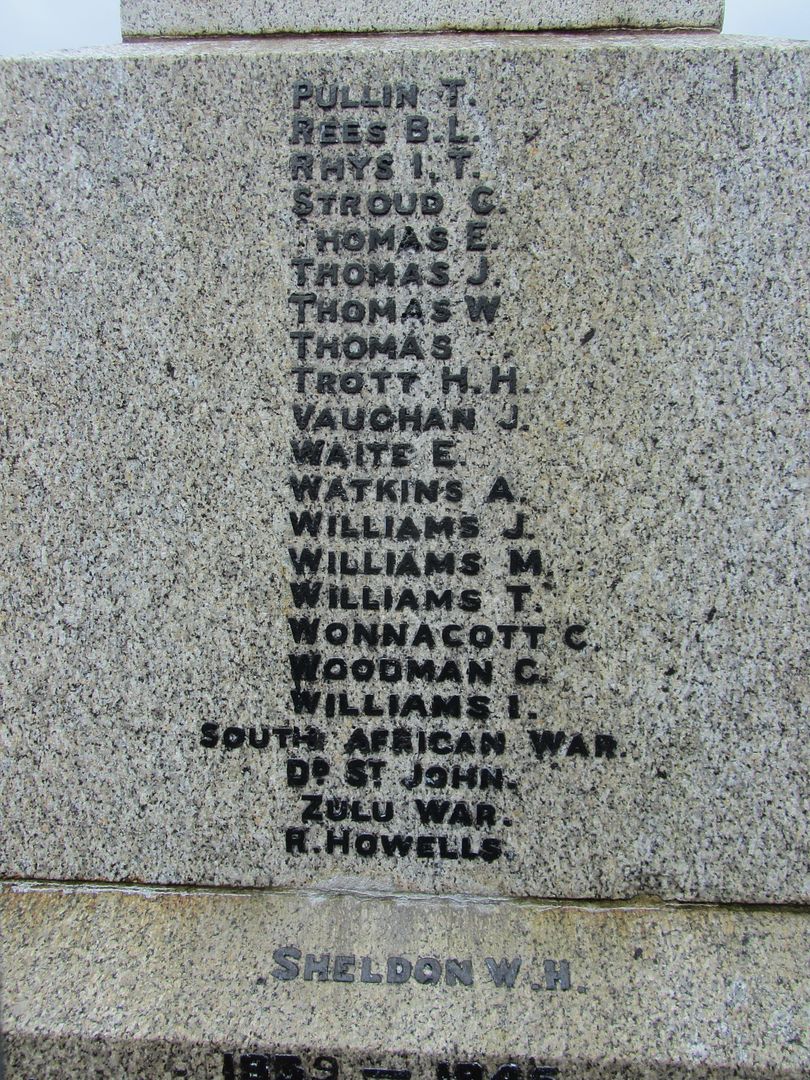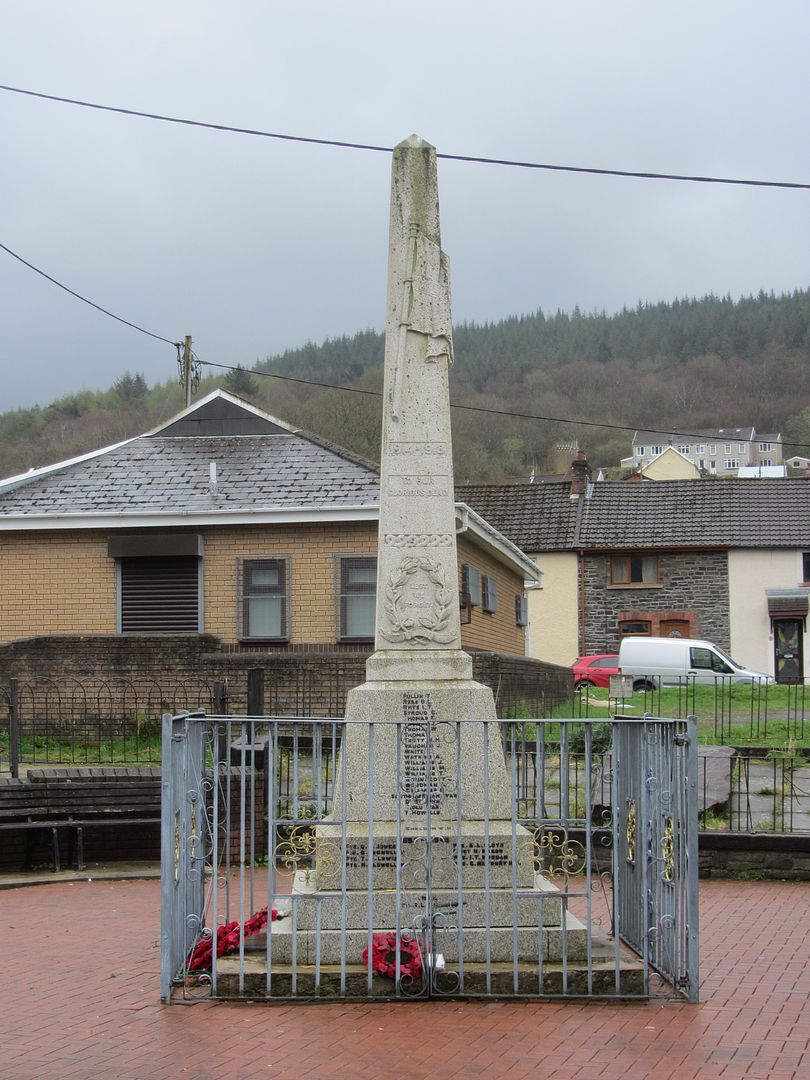|
Welcome,
Guest
|
TOPIC:
6027 Private David St. John, Grenadier Guards - k.i.a. Belmont 23.11.1899 8 years 3 months ago #56530
|
A memorial stone for Dai St. John (born David Jones) is in St. David's churchyard, Resolven, near Neath, South Wales; the Grenadier Guards Association was responsible for its repair in 1997.
eclecs.blogspot.co.uk/2010/03/in-search-of-saint.html In addition, a pottery jug was produced some time after Belmont, to memorialise Dai. eclecs.blogspot.co.uk/2012/01/mr-t.html en.wikipedia.org/wiki/Dai_St._John Dai St. John in action at Belmont (below).
DEATH OF DAVID ST. JOHN.
"Welsh Athlete" writes: - There will be many sportsmen in South Wales who will hear with no small degree of sorrow of the death of David St. John, of Resolven, one of the very best heavy-weight pugilists we ever turned out of Wales. It only seems a few days ago - as a matter of fact I suppose it was not more that four or five weeks - when I met him in St. Mary-street, Cardiff, en route for the Great Western Railway Station to join his regiment at Wellington Barracks. We had, as it turned out, a farewell cup together, and then he told me that he had just bade "Good-bye" to his sister, to whom he was passionately attached, and expected to start for the Transvaal a few days after he re-joined the colours. He was a handy sort of pal to have in any sort of a row, too, was St. John. He stood 6ft. 1½in. to 6ft. 2in., was absolutely without fear, and was as strong as a lion. During his career in the prize-ring his most notable fight was that with John O'Brien at the National Sporting Club. He had had one or two fights of no particular consequence in Wales, and won all of them. Bob Habbijam wired to me one night to ask me to send St. John up to London. The Resolven man went up immediately, and Habbijam and his crowd of fellow-sportsmen fell dead in love with him. Shortly after this some sportsmen from Pontypridd matched him to fight O'Brien. I should say it would be about six years ago now when that fight came off at the National Sporting Club. I shall never forget it. To this day members of the National Sporting Club speak of it as the greatest fight between big 'uns ever seen in the Covent Garden establishment. There was some of the hardest punching man ever saw, how hard may be guessed from the fact that O'Brien, one of the best men and hardest hitters that ever lived, was hit down by St. John with fair straight punches. The fight lasted through some half-dozen rounds, if I remember aright, and 20 to 1 - nay, 100 to 1 - was in turn betted on each man. After this St. John went into the Guards, and was at once made a great favourite, so far as sport was concerned, by the officers. He won an Army competition, and then there was an offer to back him to fight any man in the Army. He went out to Gibraltar, I believe, and then to the Soudan - where he gained a medal for fighting at Omdurman - with his regiment, after which he came home on the Reserve list. A few weeks ago, as I mentioned above, he was called up, and went out with his regiment. In the fight at Belmont on Thursday he was killed fighting bravely for his country. That he held his own if he was in the bayonet charge there can be no doubt. As I say above, he was a handy sort of a man to have on one's side at any time, and in the fight at Belmont I guarantee he was a credit to himself and to his country. Poor old Dai! Evening Express, Monday 27th November 1899 __________________________________
A TALE OF DAI ST JOHN.
A very pathetic little incident is related of Dai St. John's last visit to Neath the night before his departure to re-join his regiment at the call to arms. He spent a little time at the Rock Hotel, where he was wont to call, and on departing handed a shilling to Mr. Phillips, the landlord, saying, "If I don't come back here drink to my memory. If I do we'll drink it together." St. John, in spite of his combative proclivities, had a gentle heart.Evening Express, Thursday 30th November 1899 __________________________________
HOW DAI ST. JOHN DIED.
THE FAMOUS PUGILIST'S LAST STAND. A COMRADE'S STORY. WORD-PICTURE OF THE SCENE BY A SWANSEA GRENADIER. Of the letters received from the seat of war, one of the most interesting is that which we have at the "Daily Post" office from Private J. Argent, of the 3rd Grenadier Guards, whose parents reside at 98, Western-street. He writes : No doubt you have read about the Battle of Belmont. I was in the charge up the hill. We fought hand to hand. I was just behind David St. John when he was shot. He stuck his bayonet right through a Boer, and could not get it out again. He tried to throw the man over his shoulder to get him off, and then another Boer came up and shot him through the head. Then another of our men put his bayonet through that Boer's heart. We had to charge up a hill like Kilvey Hill, and the enemy were firing at us all the time, the bullets dropping on all sides of us. When we got to the top we cut them to pieces with our bayonets. I was mad, and so were all our men when we charged the hill. The Boers ran, and we ran after them for miles. We were fighting from 4.5 a.m. till 9.15 a.m. Parker (brother to the footballer) was wounded just as the battle started - before the charge. We fought another battle (Graspen) yesterday (the 25th). It lasted five hours. There were 2,00 Boers on a hill, and we had to chase them out. They stop and fire at you till you get very near the top, and then they run as soon as they see our bayonets. They can't stand cold steel. Gilbert (another local man) is alright so far. We will probably fight again to-morrow. We are now 10 miles from Kimberley, and if I get through I shall have gone 200 miles. But I am doing it for my country. The remainder of the epistle is of a consolatory character, and winds up with, "Don't grieve if I get shot. Good-bye if this should be my last." The South Wales Daily Post, Wednesday 20th December 1899 __________________________________
LATE DAI ST JOHN
A correspondent inquires what has become of the committee which was formed some time ago for the purpose of raising sufficient funds to erect a suitable memory of the late Dai St. John, "the hero of the fierce Battle of Belmont" - a daring soldier, who killed eleven Boers in this encounter, after which he himself fell, having no weapon with which to defend himself. The correspondent, after saying that "the British Army had no braver lad than the Welsh genial giant of the Rhondda," adds that he has not the "slightest doubt if the appointed secretary called the committee together that the necessary funds would be quickly subscribed." He personally has £9 10s. in hand. Evening Express, Tuesday 2nd September 1902 __________________________________ People of Neath and district are not likely to soon forget poor Dai St. John, and his sad fate - a fate which more than compensated for the little peccadilloes he committed during his life. There was one person whom Dai loved with all the ardour of a passionate nature, there was one person whom he never forgot during the turmoil of the life he lived - his mother. And no one loved son better than she. She has passed away, and some friends are going to place a headstone over her grave. The inscription to be placed on the stone has been composed by a Seven Sisters' collier. As a literary effort it would not stand the fire of criticism, but as the work of a friend it can be commended. I give the inscription in English and Welsh. "Here lies the mother of a son, Who bravely died on the battlefield; For England's glory held a gun, And fell beneath his sword and shield. In Africa, on a lonely grave, England has written her words "Well done" He died a Welshman, warrior and brave, His country called him - "Dai St. John.'" "Fan hon y gorwedd tyner fam, Tra'i hysbryd at y Bryniau Gwell; Ond huno mae ei mab diuam, Yn nghysgod creigion Affrig bell, Yn nhymesthl erch magnelau'r gadd, Yn ddewr y cwmpodd - ein St. John. Ond mau ai mab gant gwrdd uwch brad, Mewn esmythad yn nywynfa lon."
"OBSERVER."
The Cambrian, Friday 7th April 1905__________________________________
LATE DAI ST. JOHN
Mainly through the efforts of Mr. John Thomas, "Jack Pembrey," a well-known Cardiff sportsman, £7 has been raised towards providing a memorial to the late Dai St. John, the Welsh pugilist, who was killed in the battle of Belmont during the South African war.The memorial has taken the form of a headstone placed on the grave of the deceased man's mother in Resolven Churchyard. Evening Express, Tuesday 2nd May 1905
The following user(s) said Thank You: Moranthorse1
|
|
Please Log in or Create an account to join the conversation. |
6027 Private David St. John, Grenadier Guards - k.i.a. Belmont 23.11.1899 8 years 3 months ago #56537
|
Thanks Berenice, many years ago I had the opportunity to buy the commemorative jug, but couldn't afford it. Never seen one since.
Researcher & Collector
The Register of the Anglo-Boer Wars 1899-1902 theangloboerwars.blogspot.co.uk/ www.facebook.com/boerwarregister
The following user(s) said Thank You: Moranthorse1
|
|
Please Log in or Create an account to join the conversation. |
6027 Private David St. John, Grenadier Guards - k.i.a. Belmont 23.11.1899 8 years 1 month ago #57161
|
Elmarie Malherbe
The following user(s) said Thank You: BereniceUK, Moranthorse1
|
|
Please Log in or Create an account to join the conversation. |
6027 Private David St. John, Grenadier Guards - k.i.a. Belmont 23.11.1899 7 years 10 months ago #58367
|
The inscription ended up not being the original proposal.
In
LOVING MEMORY OF David St. John PRIVATE QUEEN'S CO. 1ST BAT. GRENADIER GUARDS , KILLED IN ACTION AT BELMONT , SOUTH AFRICA , NOV'R 23RD 1899, AGED 28 YEARS.
HE
ALSO SERVED WITH HIS
BATTALION
IN
EGYPT
.
HOW CALMLY SLEEPS THE BRAVE TO REST, WHO FOR HIS COUNTRY DONE HIS BEST WITH LOYAL HONOURS ONCE DID STAND THE WELSHMAN HERO OF HIS BAND AND ON THE BATTLEFIELD DISPLAYED THE BRITISH SOLDIER IN HIS PRIDE. THOU AFRICA'S BREEZE WHEN YOU ROLL ON GREEN THE SOD WHERE LIES "DAI ST. JOHN."
ERECTED IN REMEMBRANCE BY HIS SISTER & BROTHERS.
Part of the 1997 repair?
The following user(s) said Thank You: Elmarie, SWB, Moranthorse1
|
|
Please Log in or Create an account to join the conversation. |
6027 Private David St. John, Grenadier Guards - k.i.a. Belmont 23.11.1899 7 years 4 months ago #60882
|
The following user(s) said Thank You: Elmarie, Moranthorse1
|
|
Please Log in or Create an account to join the conversation. |
6027 Private David St. John, Grenadier Guards - k.i.a. Belmont 23.11.1899 4 years 3 weeks ago #81420
|
MORE ABOUT DAI ST. JOHN
IMAGE 1: The front cover, featuring Dai St. John, of a book by Lawrence Davies published in 2012, and now out of print. David Jones was born in Resolven, Glamorganshire, Wales on 1st April 1871. He was better known as Dai St. John, the name he boxed under. By the average of the day, Dai was a man of huge stature, being 6'4" in height and powerfully built. The average man at the time was around 5'5". I will use newspaper articles written by those that knew him to enlighten the reader to his boxing experience and the sad demise of this giant folk legend. First of all, I will visit his military career prior to South Africa. 6027 Private Dai St. John served with the 1st Battalion of the Grenadier Guards on the Expedition to Khartoum and received the silver Sudan Medal with the clasp "KHARTOUM" (WO100/80). It was with the 3rd Battalion Grenadier Guards, that he went to South Africa and fought in the battle of Belmont where he was killed in action. For his all too short service he received posthumously, the Queens South Africa medal the single clasp BELMONT. His name is commemorated on the Welsh National Boer War Memorial at Cathays Park, Cardiff and at the Holy Trinity gallery panels of the Household Cavalry and Guards at Windsor, England. As Berenice posted earlier, he is also named on the village war memorial at Resolven and on his mother's gravestone. Additionally,his name is to be found in South Africa on the memorial to the men who lost their lives in the battles of Belmont (23/11/1899), Enslin (25/11/1899), Graspan (25/11/1899), Modder River (28/11/1899), and Magersfontein (11/12/1899). IMAGE 2: Monument in South Africa. IMAGE 3: Panel showing Dai's name. From the South Wales Daily News dated 27th November 1899; p.5: A WELSH PUGILIST KILLED. "The Belmont casualty list includes the name of a native of Resolven, near Neath, who was well known throughout South Wales by those interested in pugilism, Vic, "Dai" St. John.Standing 6'5" high, with a huge frame, this burly man was for years employed as a collier at Glyn-Neath,at which place he resided with his mother and stepfather. As a local champion in the ring bSt. John fought and defeated Tom James,of Aberdare, on two occasions, but was subsequently beaten in a fight with John O'Brien, of Cardiff, after a contest extending to the sixth round. It will be remembered also that he was acquitted with a number of others who had been committed to the assizes with the death of a man in a boxing booth at Aberdare. The other casualties include A.F.M.Hall,1 Wood Street, Penarth: Thomas Griffiths,46, Tonna Road, Spelter, Maesteg: E.T.Parker, 59, Little Madoc Street, Swansea." From the South Wales Daily News dated 28th November 1899; p.5: LOCAL CASUALTIES DEATH OF DAI ST.JOHN. RHONDDA CONSTABLE WOUNDED. "Our Pontypridd correspondent writes:- "The news that Dai St.John was killed during the gallant charge of the guards at Belmont was received with deep regret on Monday by the sporting fraternity in Pontypridd and the Rhondda Valley, where he was well known for many years as an able exponent of the'noble art.' He was about 26 years of age, and the cutting down of one so strong and in the prime of life brings home very keenly the horrors of war among his many admirers. Dai as he was familiarly kno, had spent 3 years with the colours---those of the Grenadier Guards---and had only been home about two months before he was called out as a Reserve for active service." From the South Wales Daily News dated 30th November 1899; p.5: BELMONT. VICTIMS FROM SOUTH WALES. 4 KILLED AND 2 WOUNDED. "It will be observed that the official list of killed and wounded at Belmon, which has now been issued, confirms the news published previously by us that Privates Mordecai Watkins (Abertillery), Thomas Griffiths (Penarth), Mortimer Whelan(Briton Ferry), and Dai St. John (Resolven), all of the Grenadier Guards were killed, and that Private D. Bowen (Treorky) and Private A.F.M.Hall (Penarth), of the same regiment have been wounded. ANALYSIS OF THE LOSSES. The Exchange Telegraph Company wires the following details of the losses:- Grenadier Guards-19 killed--124 wounded--2 missing. 9th Lancers-0 k--4w--0m. 18th Field Battery-0k-4w-0m. Northumberland Fusiliers-10k-36w-0m. South African Reserves-1k--3w--0m. 2nd Northamptonshire Regiment-0k--15w--0m. 1st Coldstream Guards--7k--20w--9m. 2nd. Coldstream Guards--0k--6 w--0m. 1st Scots Guards--8k--35w--0m. 2nd. Yorkshire Light Infantry--0k--5w--0m. TOTAL= 45 killed 249 wounded 2 missing." Dai St. John died a true warrior's death at the battle of Belmont. He was definitely a man you would want on your side in a scrap!
The following user(s) said Thank You: QSAMIKE, BereniceUK
|
|
Please Log in or Create an account to join the conversation. |
Moderators: djb
Time to create page: 0.329 seconds
- You are here:
-
ABW home page

-
Forum

-
Anglo Boer War (1899-1902)

-
Miscellany

- Appleton's "The Volunteer Service Company (1st South Lancashire Regiment)"

